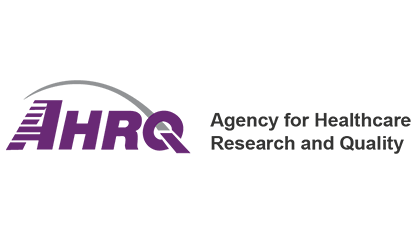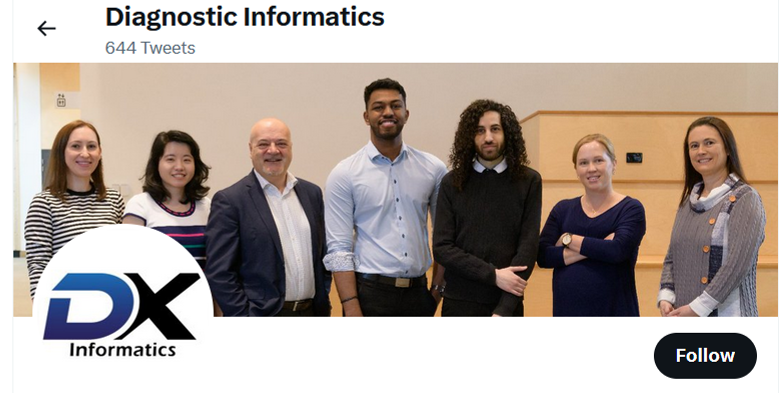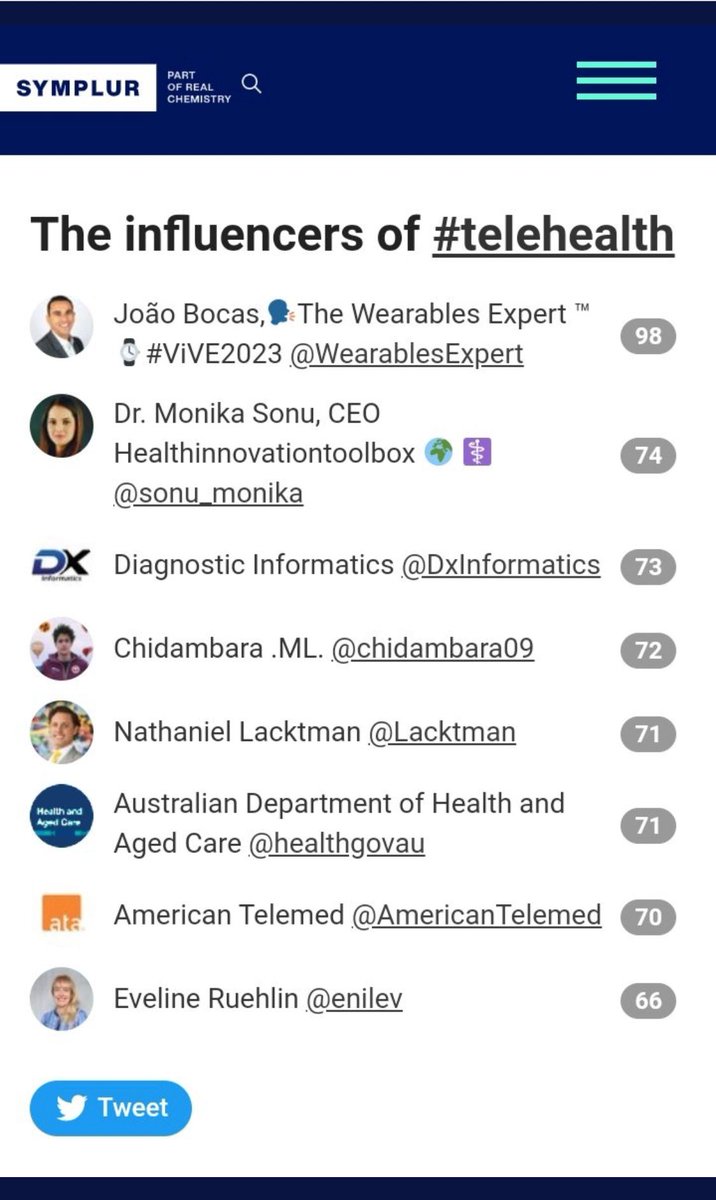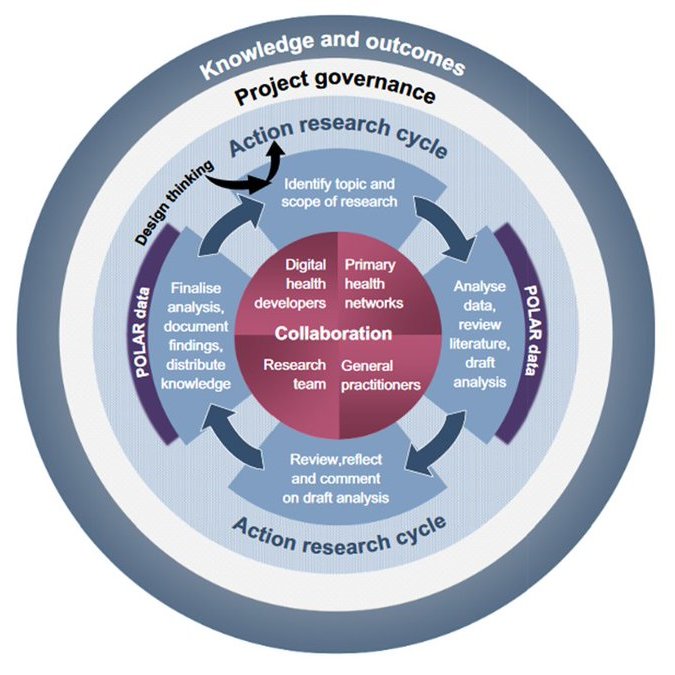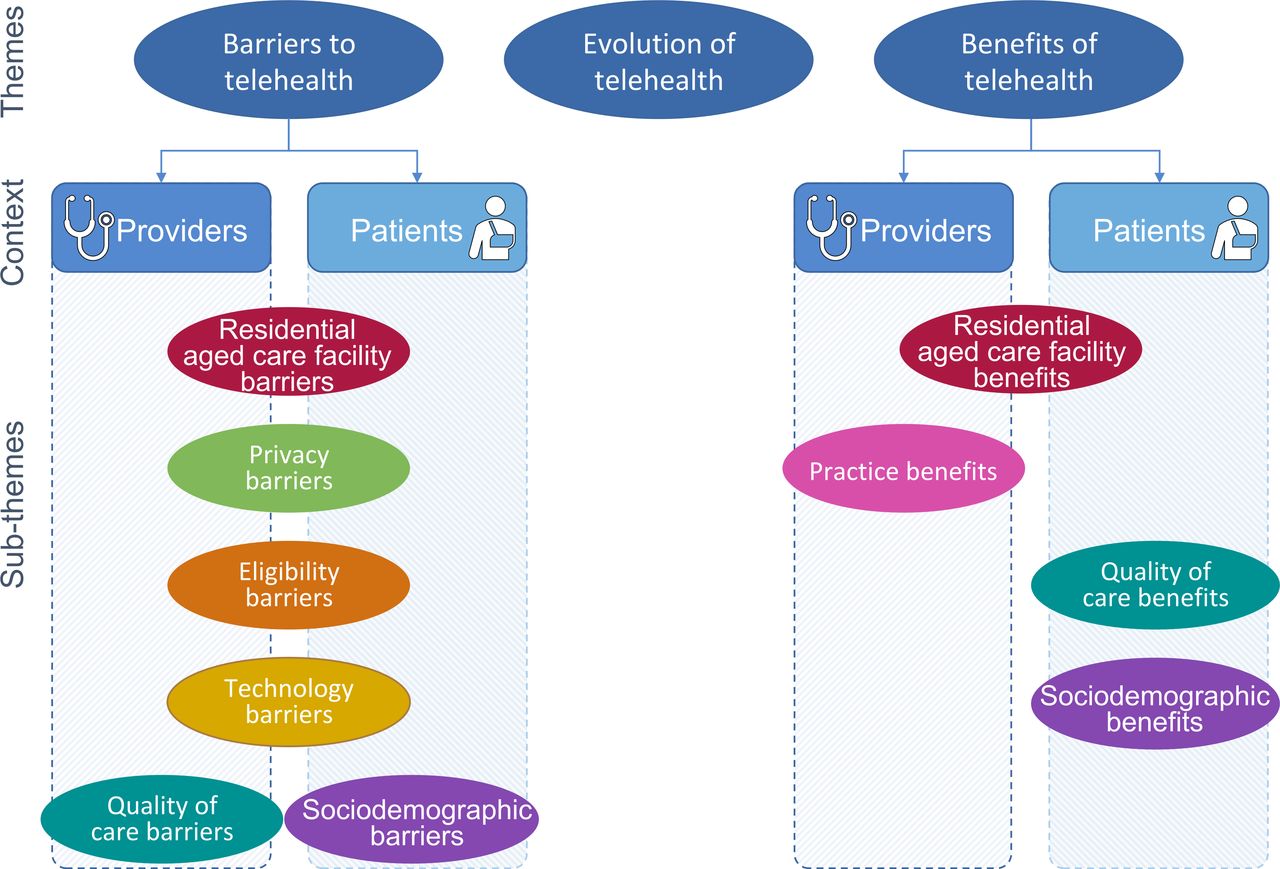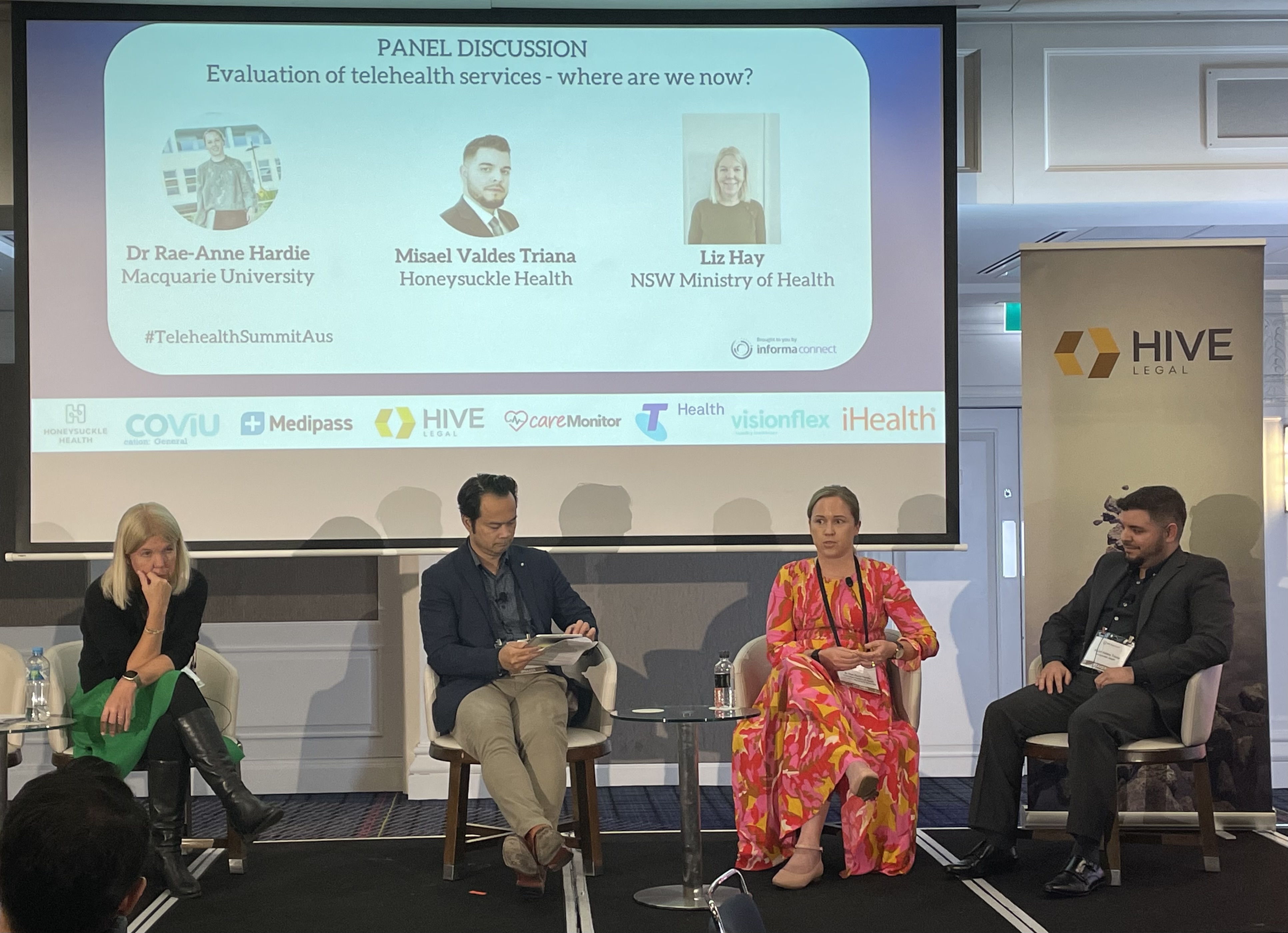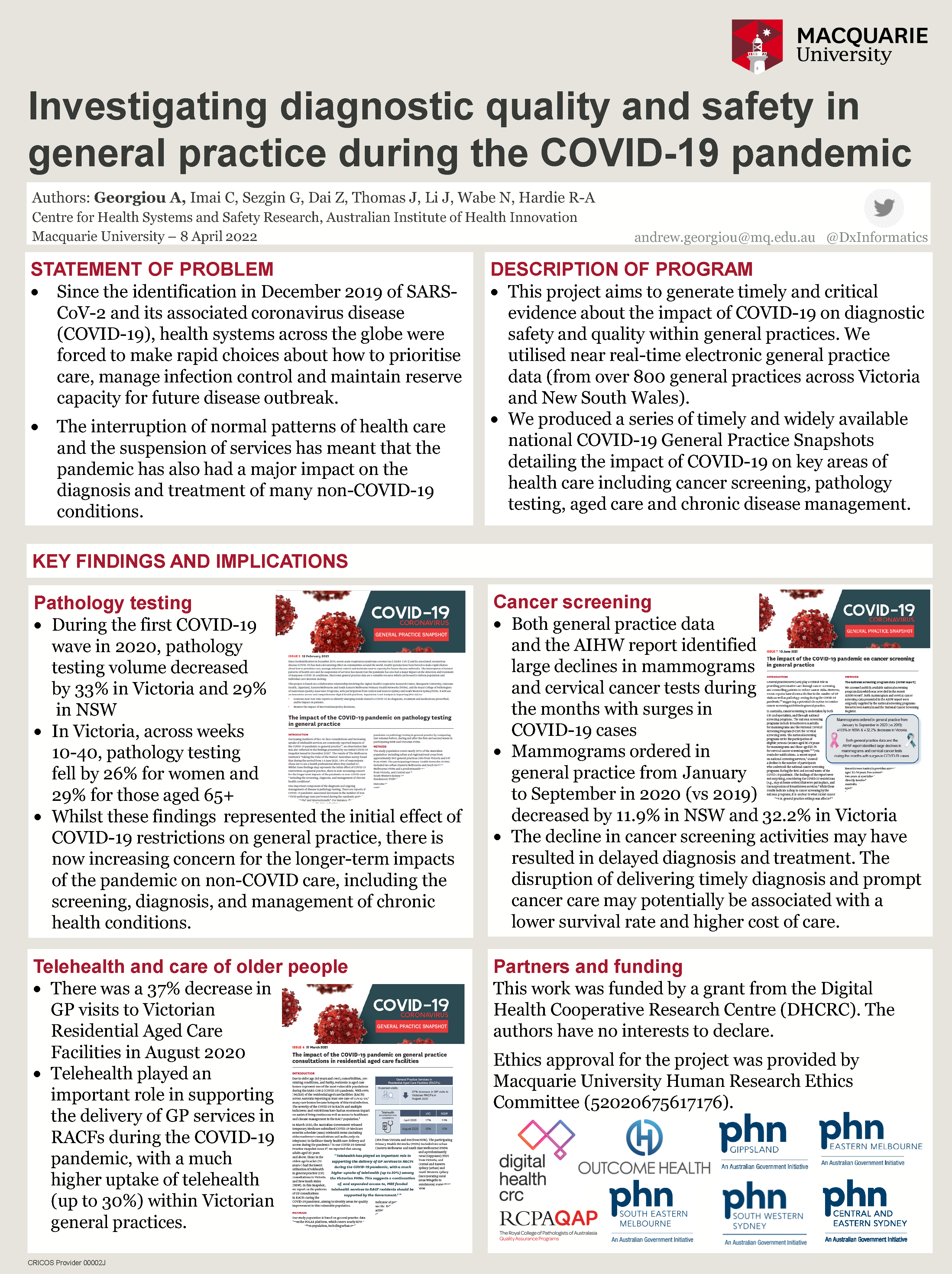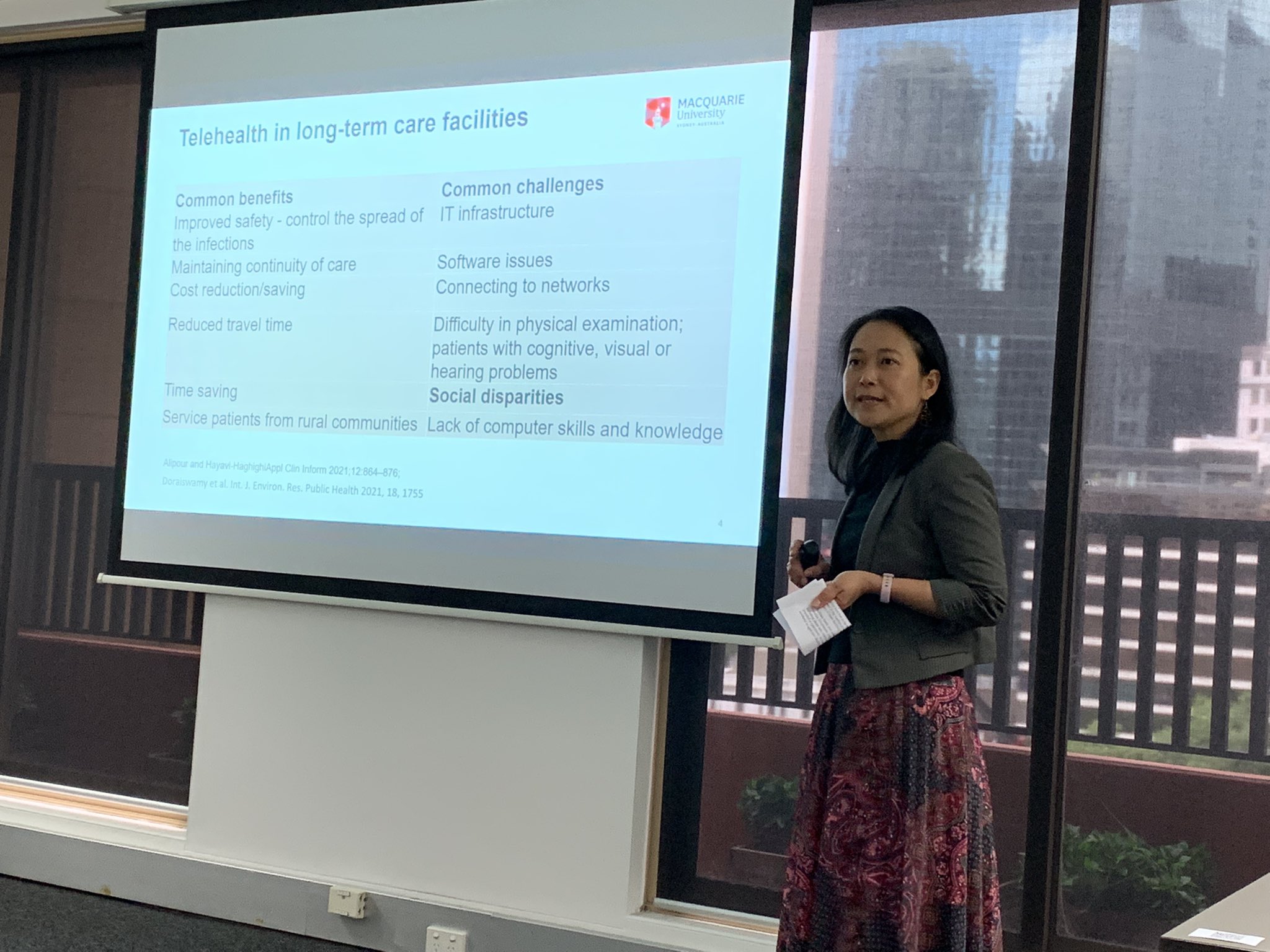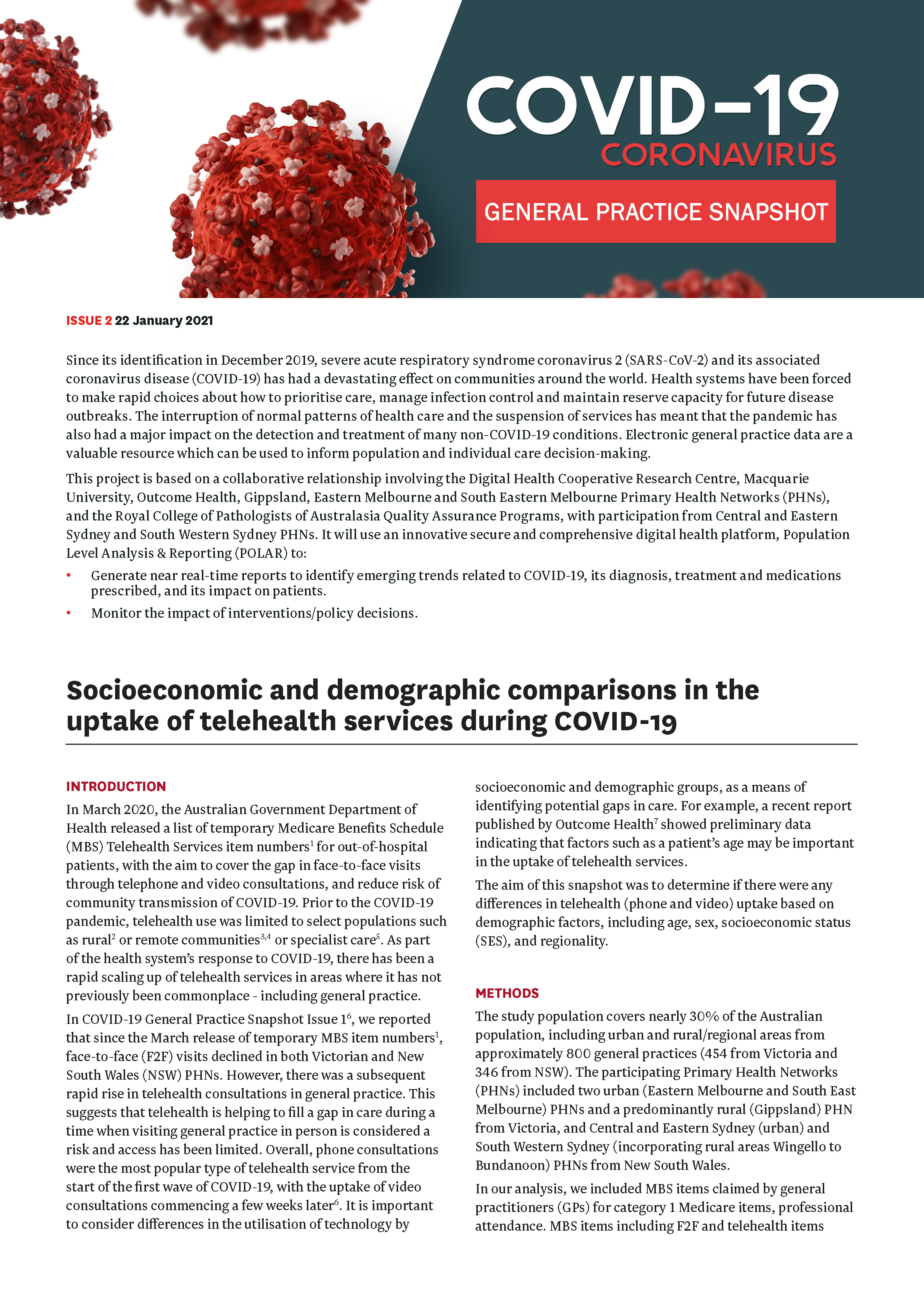Diagnostic Informatics News
Previous Diagnostic Informatics news
| Abbish awarded his PhD with honoursA huge congratulations to Abbish Kamalakkannan, our Postdoctoral Research Fellow, who was awarded his PhD with an Award of Excellence in a Research Thesis from Griffith University. He will also be considered in the next year's selection for the Chancellor's Medal for Excellence in the PhD Thesis for 2023. Well deserved Abbish! |
| Patient and practice factors associated with HbA1c testing frequency in patients with type 2 diabetes: a retrospective cohort study in Australian general practiceBetter adherence to guideline-recommended glycated haemoglobin A1c (HbA1c) testing frequency is associated with better glycaemic control and lower risk of complications such as chronic kidney disease in patients with type 2 diabetes mellitus (T2DM). However, the maintenance of consistent and regular monitoring care is a major challenge in T2DM management, and is impacted by a multitude of factors. A paper led by Dr Chisato Imai in the Australian Journal of Primary Health found that patient age and anti-diabetic medications were associated with adherence to the recommended 6-monthly frequency of testing. Incentive payments also resulted in better adherence to guideline-recommended monitoring care at larger practices. |
| Use of Telehealth During the COVID-19 Era: a systematic review for the Agency for Healthcare Research and QualityOur research on medication prescribing in face-to-face versus telehealth consultations during the COVID-19 pandemic, originally published in BJGP Open was selected for inclusion in a systematic review produced for the Agency for Healthcare Research and Quality on the use of telehealth during the COVID-19 era. The review concluded that the use of telehealth may be comparable to in-person care across different clinical and process outcomes and has provided a viable alternative mode of care delivery during the pandemic. |
| Difference in general practice telehealth utilisation associated with birth country during COVID-19 from two Australian statesNew research led by Dr Gorkem Sezgin assessed telehealth utilisation in Australian general practices between patients born in Australia/New Zealand and those born in other countries. The study provided key evidence which suggested that patients born in English-speaking countries use telehealth more than those who were not, and a higher education level was associated with an increased likelihood of telehealth use. Strategies to ensure continued healthcare access for patients whose native language is not English, such as providing interpreter services for telehealth consultations or referral to doctors who can speak patients’ native languages were also recommended. |
| Telehealth Influencers on TwitterThe Diagnostic Informatics twitter (@DxInformatics) was identified as one of the top eight influencers in the telehealth space in February by Symplur, a healthcare social media data analytics organisation.
|
Opioid prescribing among aged care residents during the first year of the COVID-19 pandemic: an analysis using general practice health records in AustraliaChronic pain is a common condition in older adults, affecting up to 80% of long-term care residents. Optimal pain management is a vital metric for the quality of care in residential aged care facilities (RACFs), however long-term use of opioids for chronic non-cancer pain remains controversial. An article led by Dr Zhaoli Dai-Keller examined how sociodemographic characteristics and general practice care delivery modes affected opioid prescriptions in RACFs before and during the pandemic. It found that prescription rates of opioids were higher during the COVID-19 pandemic. Odds of prescription opioids and dosing were also higher in rural/regional than metropolitan areas, indicating a widening of the gap in the quality of pain management during the pandemic. | |
| A framework for conducting policy-relevant primary care research: a COVID-19 case study in Australia8 December 2022 The onset of the pandemic impacted the delivery of Australian primary care services. Dr Judith Thomas’ paper in the Australian Journal of Primary Health reports a research project undertaken in the first 2 years of the pandemic to determine its impact on Australian general practice activity. The project methodology was based on an established research approach called action research, which involves participatory involvement from key stakeholders throughout the research process. The project approach, knowledge outputs and lessons learned can be adapted to future research undertakings across any primary care setting and highlight the utility of action research and interdisciplinary research collaboration to produce knowledge directly relevant to clinical practice.” |
| Identifying the benefits and barriers to telehealth use in General Practice during the COVID-19 pandemic using an Action Research Approach8 December 2022 The introduction of telehealth during the pandemic has been hailed a successful new mode of care delivery. However, uptake among general practice has been variable. A new paper by Dr Rae-Anne Hardie published in BMJ Open identified the benefits and barriers of telehealth use in general practice using an ‘Action Research’ approach involving general practitioners (GPs) and general practice stakeholders. Findings highlighted a range of barriers to telehealth that impact general practice, but also provide justification for the continuation and development of telehealth. They also emphasised areas of quality improvement for the enhancement of telehealth as a valuable tool for routine care.” |
| An increase in antibiotic prescribing for respiratory tract infections through telehealth consultations: retrospective study in Australian General Practice25 October 2022 A research letter by Dr Chrissy Imai, published in the Journal of Medical Internet Research, examined antibiotic prescribing for respiratory tract infections via telehealth in comparison with face-to-face consultations during the pandemic, following an earlier study that showed lower rates of medication prescriptions via telehealth compared to face-to-face consultations in Australian general practice. Her study found that whilst rates of antibiotic prescribing via telehealth was initially much lower than face-to-face consultations, the prescribing rates between the two consultation modalities became equivalent toward the end of the study period (Nov 2021). Such findings highlight the need for monitoring of the impacts of telehealth on medication prescribing in general practice and evaluation of prescribing adequacy. |
| New 5-year NHMRC Partnership Project in Digital Health recruiting11 July 2022 We are recruiting for a Postdoctoral Research Fellow or Research Fellow in Applied Biostatistics/Health Services Research to join the team. To view this opportunity and details on how to apply, please visit the Jobs page. See more information on this exciting new project. |
| Presentation at 4th Aged Care Technology Summit Sydney - Professor Andrew Georgiou17 June 2022 The 4th Annual Aged Care Technology Summit, held at the Sofitel Sydney Wentworth from 15-17 June 2022, addressed the key challenges to upskilling the aged care workforce, engaging stakeholders and ensuring that technology implementation achieves the intended outcomes. As an invited speaker, Professor Georgiou's presentation, "Monitoring the impact of COVID-19 on aged care – a digitally-enabled, general practice-centered approach" discussed the utilisation of near real-time electronic general practice data in measuring Australians’ access to health services and coordinated care through the use of telehealth services, and identifying the barriers to telehealth adoption including client/carer readiness, lack of information on ROI and the absence of consistent standards. |
| Telehealth use in patients with type 2 diabetes in Australian general practice during the COVID-19 pandemic: a retrospective cohort study31 May 2022 A paper by Dr Chrissy Imai was recently published in the British Journal of General Practice on the uptake of telehealth consultations in Australian general practice for the management of type 2 diabetes during the pandemic. The study found that telehealth consultations were well utilised by patients with type 2 diabetes, and that diabetes monitoring care via telehealth was as effective as face-to-face consultations. Read the open access article here. |
“Value to the practice and value to the patient” – Panel Contribution by Dr Rae-Anne Hardie at the National Telehealth Summit5 May 2022 One of four invited experts to contribute to an examination of the state of telehealth in Australia, Dr Rae-Anne Hardie presented key findings from the COVID-19 – utilising near real-time electronic General Practice data to establish effective care and best-practice policy project at the 2022 Informa National Telehealth Summit at the Swissotel Sydney, from 4-5th May. Moving forward, Rae-Anne emphasised the importance of identifying areas where telehealth could deliver the greatest value, and echoed the sentiment of many at the summit to heed the lessons learnt from the pandemic for improving care and care delivery. | |
| Poster Presentations at the ANZA-SIDM 2022 Conference29 April 2022 Members of the team presented posters at the virtual Australia and New Zealand Society to Improve Diagnosis in Medicine conference, which took place over 28-29 April. Professor Andrew Georgiou gave a summary of the COVID-19 – utilising near real-time electronic General Practice data to establish effective care and best-practice policy project, whilst Dr Rae-Anne Hardie spoke about the innovative Action Research element of the same study. Ms Julie Li presented an excerpt of findings from the Quality use of Pathology in General Practice project. Both Andrew and Julie’s posters were awarded for being two of the four top poster abstracts of the conference. |
| Diagnostic Informatics Represented at the Australian Association of Gerontology ConferenceDr Zhaoli Dai-Keller chaired and presented on the proportion of telehealth versus face-to-face consultations with GPs in residential aged care during the COVID-19 pandemic at the 54th Australian Association of Gerontology Conference held from the 9-12th November 2021. Her analysis revealed that telehealth consultations sufficiently filled the gap in GP service delivery effected by the pandemic in residential aged care facilities. |
Formula milk trials lack scientific rigourDr Zhaoli Dai-Keller is a co-author of a recent study published in the BMJ, “Conduct and reporting of formula milk trials: systematic review”. This comprehensive analysis found that formula milk trials have a high risk of bias, almost always reported favourable conclusions, lacked transparency, and selectively reported findings. The article is endorsed in a media release from the BMJ, and has sparked debate about the role of industry in ensuring research integrity and independence. Read more about the article in Macquarie University’s media release on Scimex here. | |
| Diagnostic Informatics in the media!Our recent paper, Why is there variation in test ordering practices for patients presenting to the emergency department with undifferentiated chest pain? A qualitative study, published in the Emergency Medicine Journal found that variation in laboratory test requesting practices required consideration of local and systemic factors which shaped the ordering process. Since publication, it has been featured in Hospital Healthcare Europe, a resource for best practice information, guidelines and clinician-authored case studies and summarised in a September issue of On the Radar, a newsletter of the Australian Commission on Safety and Quality in Health Care. |
| New NHMRC Partnership Project for diagnostic excellenceMacquarie University has been awarded $1 million in National Health and Medical Research Council funding, for ‘Establishing a digital health foundation for outcomes-based diagnostic excellence, safety and value’. A further $350,00 has been provided by research partners. This funding will improve disease diagnosis and management by ensuring the right pathology and medical imaging tests are ordered and used. The project is led by Professor Andrew Georgiou and will build on an existing, highly productive collaboration bringing together Macquarie University researchers with leading clinical researchers from South Eastern Sydney, and Illawarra and Shoalhaven Local Health Districts, the Garvan Institute of Medical Research, Abbott (Diagnostics), NSW Health Pathology, Australian Commission on Safety and Quality in Health Care, teaming up with researchers from the Sydney Partnership for Health, Education, Research and Enterprise (SPHERE). |
| MJA Podcast - Prevalence of PSA testing in asymptomatic menAIHI researchers Adjunct Fellow Guilherme Franco and Dr Rae-Anne Hardie participated in a podcast with MJA news and online editor, Cate Swannell to discuss their recent research published in The Medical Journal of Australia, Prostate‐specific antigen testing of asymptomatic men in Australia: an observational study based on electronic general practice data. To listed to the podcast visit the MJA website. To ready the journal article, please follow the link. |
| Dr Rae-Anne Hardie presented at The Good Things Foundation Digital Health Roundtable on 15th AprilThe Good Things Foundation Australia held a virtual roundtable event on 15th April involving a range of participants from consumers, practitioners, academics and policy makers in the areas of digital health. Dr Rae-Anne presented our recent research on the COVID-19 General Practice Snapshot - Telehealth: Socioeconomic and demographic comparisons in the uptake of telehealth services during COVID-19. This research forms part of the project,COVID-19 – utilising near real-time electronic General Practice data to establish effective care and best-practice policy funded by the Digital Health Cooperative Research Centre. |
| Quality use of pathology in Australian general practice webinarThe Diagnostic Informatics team recently presented a Webinar to GPs in the Gippsland area. The webinar, leading to CPD fulfilment for participating GPs, described how the team used Population Level Analysis & Reporting (POLAR) data from general practice to answer important research questions that were co-designed with Gippsland PHN. This work is part of the Quality use of Pathology in General Practice project. This webinar aimed to uncover indicators of quality use of pathology testing, and in doing so, highlight key areas where general practice clinicians can: improve their efficiency by targeting testing to specific groups of patients, modify their own practice, and create better value care for their patients in a precision-oriented way. Indicators presented include HbA1c testing in diabetes, prostate specific antigen screening, Vitamin D testing, and Ferritin for iron deficiency. The new Digital Health Cooperative Research Centre project Optimising the General Practice response to COVID-19 challenges was also unveiled, encouraging GPs to participate in the design and translational aspects of the project. |
| New research: Variation in electronic results management published in the Journal of the American Medical Informatics Association (JAMIA)Dr Judith Thomas' recent paper published in JAMIA, Variation in electronic test results management and its implications for patient safety: A multisite investigation, showed that test results tracking and follow-up is a priority area in need of health information technology development and training to improve team-based collaboration/communication of results follow-up and diagnostic safety. |
| Study probes 'parallel health crises' in VictoriaAre Australians neglecting their health during the COVID-19 pandemic? Read more about this project in The Lighthouse. |
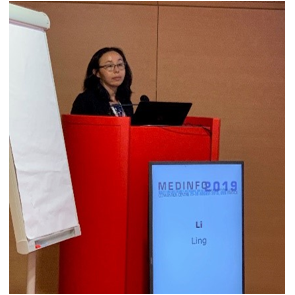 | Diagnostic Informatics at MedInfo and Context Sensitive Health Informatics conferences in FranceProfessor Andrew Georgiou and Associate Professor Ling Li recently presented a suite of new research from the Australian Institute of Health Innovation’s (AIHI) Diagnostic Informatics team at both the Context Sensitive Health Informatics conference in Lille and at MedInfo 2019 in Lyon, France. Read more here. |
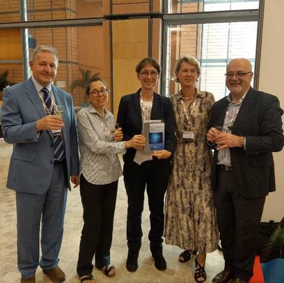 | Ground-breaking new book advocates for the advancement of theory in the field of health informaticsThe 2019 MedInfo and Context Sensitive Health Informatics conferences marked the official launch of a ground-breaking new book co-edited by Philip Scott, Professor Andrew Georgiou and Ms Nicolette de Keizer, which represented an international and interdisciplinary collaboration on the potential application of theory in the field of health informatics. Read more here. |
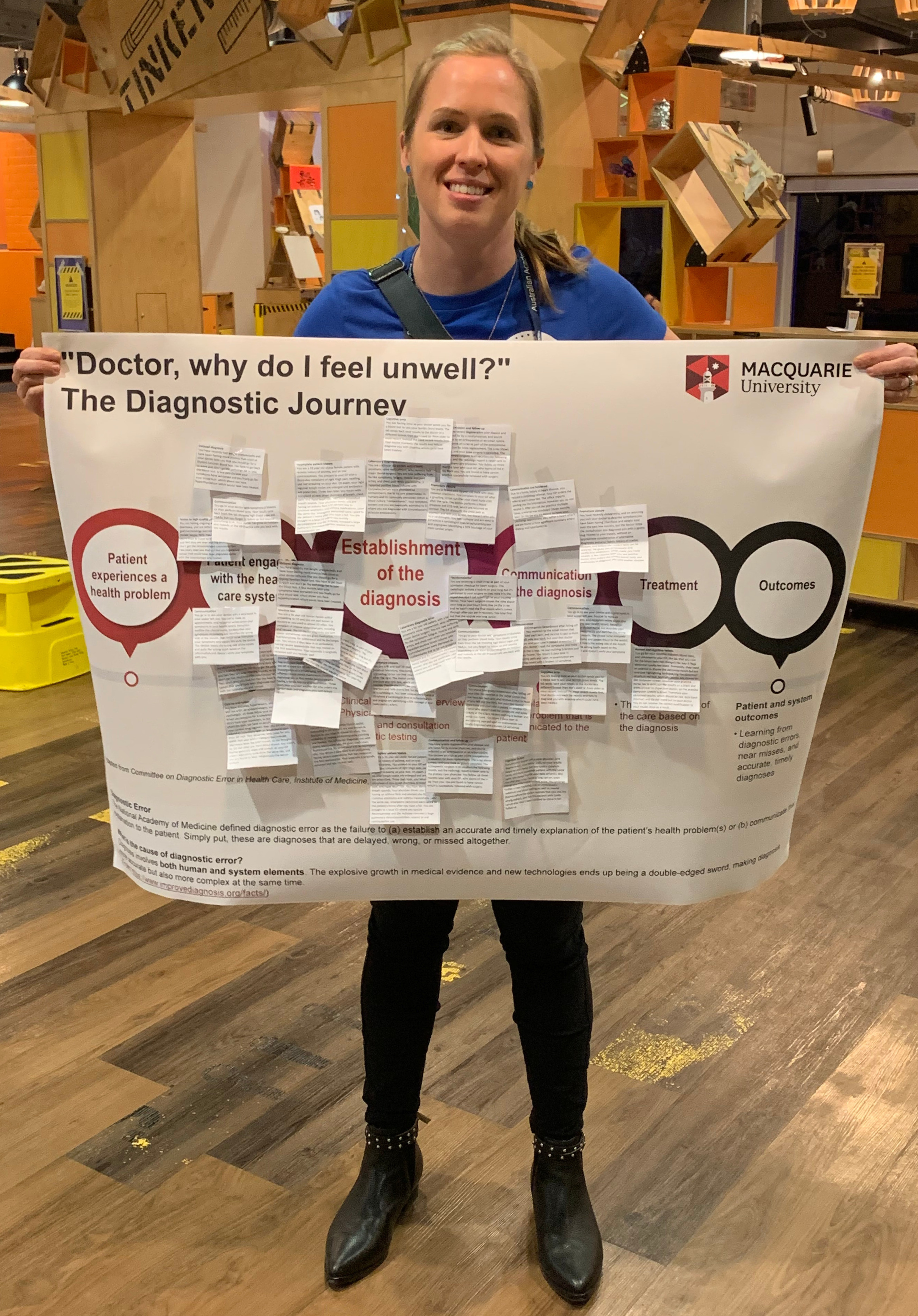 | Dr Rae-Anne Hardie presents at “Adults-Only Science” evening at QuestaconOn Monday the 2nd September, Diagnostic Informatics Post-Doctoral Research Fellow Dr Rae-Anne Hardie shared an interactive display of the diagnostic journey with over 2000 attendees of an “Adults-Only Science” evening at Questacon, hosted by the Australian Academy of Science. Dr Hardie was invited to present as an alumna of the Lindau Nobel program, a unique program connecting Nobel Laureates with top early-career researchers in Australian science. Many attendees shared personal experiences of their own diagnostic journeys, and doctors, pathologists and members of the public were excited to learn about diagnostic informatics as an area of research. |
 | Diagnostic Informatics at the 57th Annual Scientific Conference of the Australasian Association of Clinical BiochemistsDiagnostic Informatics Research Fellow Dr Mary Dahm will present a keynote address at the 57th Annual Scientific Conference of the Australasian Association of Clinical Biochemists in October in Adelaide. The conference theme is "Clinical Biochemistry - Optimising Value in Healthcare", and Dr Dahm will be speaking about "The Far Side of the Moon - Quality use of pathology - the post-analytical phase". The conference will also feature Visiting Fellow Professor Andrea Rita Horvath on the effective communication of significant results, and the development of an innovative course for the development of systematic reviews to provide evidence for alert thresholds for critical laboratory results. The course was developed by the Diagnostic Informatics team, including Dr Rae-Anne Hardie, Ms Julie Li, Dr Que Lam, Professor Andrea Rita Horvath and Professor Andrew Georgiou, with input from Diagnostic Informatics Higher Degree Research students Craig Campbell and Wilson Punyalack, in conjunction with the Royal College of Pathologists of Australasia and Australasian Association of Clinical Biochemists (RCPA-AACB) Critical Laboratory Results Working Party. The reviews will inform the creation of harmonised best practice guidelines in Australasia to improve the practice of evidence-based laboratory medicine (EBLM) in the diagnostic process. |
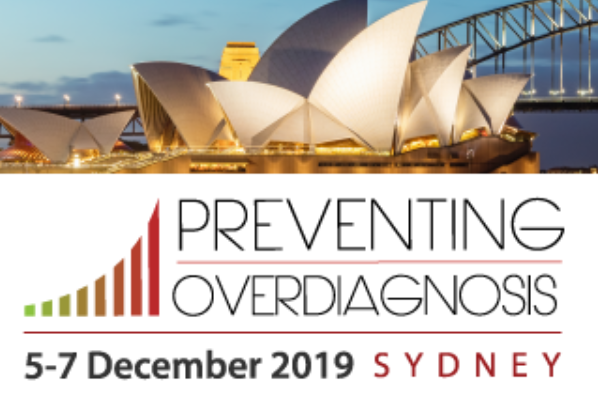 | Preventing Overdiagnosis conference 2019This December, the seventh international Preventing Overdiagnosis conference, co-sponsored by the World Health Organization, will feature two oral presentations from the Diagnostic Informatics team at the Australian Institute of Health Innovation and Macquarie University. Diagnostic Informatics PhD candidate Mr Gorkem Sezgin, supervised by Professor Andrew Georgiou, will present a decade of evidence in “Vitamin D test ordering practices of Australian general practitioners between 2007 and 2017: evidence from electronic health records”. Mr Sezgin’s research determined the procedures and diagnoses associated with the utilisation of vitamin D testing among Australian general practitioners and described the change in its use throughout the last decade. The conference will also feature “A snapshot of prostate-specific antigen testing in general practices across three Primary Health Networks in Victoria” by Diagnostic Informatics Biostatistician Mr Guilherme Franco, Associate Professor Ling Li and Professor Andrew Georgiou. The team investigated the use of a screening testing for prostate cancer in general practice beyond the recommended frequency and target population among Australian men. Both presentations raise awareness of potential unnecessary testing during the diagnostic process. The conference will be held in Sydney, Australia on the 5-7th of December 2019. |
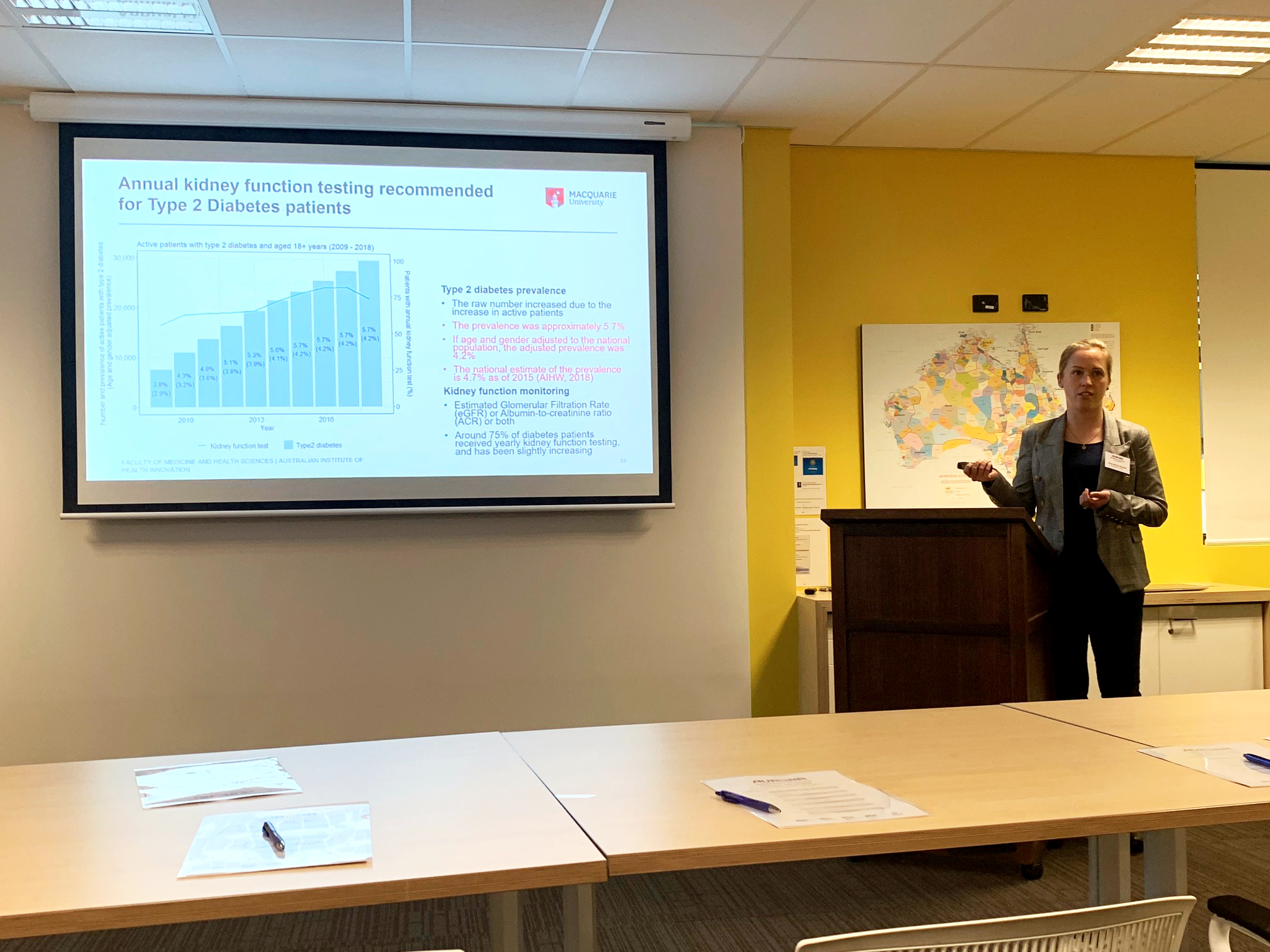 | Dr Rae-Anne Hardie presents at the Aurora Research Showcase in MelbourneOn Thursday 18th July Diagnostic Informatics Post-Doctoral Research Fellow Dr Rae-Anne Hardie presented the team’s work on the Quality Use of Pathology in General Practice at the Aurora Research Showcase in Melbourne. The event was hosted by Diagnostic Informatics partner Outcome Health at the South Eastern Melbourne Primary Health Network, and showcased the use of Outcome Health’s POpulation Level Analysis and Reporting (POLAR) tool. The showcase was attended by researchers, clinicians, data managers and Primary Health Networks (PHNs), and provided the opportunity to learn how POLAR-supported research benefits PHNs and primary care. |
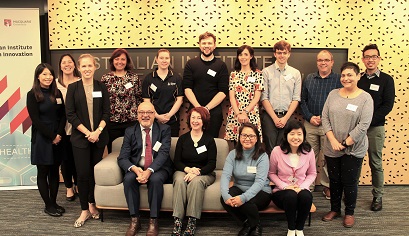 | AIHI Diagnostic Informatics team host the opening session of a ground-breaking 16-week courseOn Friday the 14th June, the Diagnostic Informatics team from the Australian Institute of Health Innovation at Macquarie University hosted a workshop to mark the start of a ground-breaking 16-week course on the ‘Development of systematic reviews to provide evidence for alert thresholds for critical laboratory results’. |
 | AIHI Diagnostic Informatics research on rapid diagnostic testing for respiratory viruses to be published internationallyFor respiratory viruses like the flu, Dr Nasir Wabe and a research team including Associate Professor Ling Li, Dr Mary Dahm, Professor Johanna Westbrook and Professor Andrew Georgiou have found there are better patient and laboratory outcomes associated with rapid diagnostic testing in Emergency Departments compared to standard testing. The research will be published in the Medical Journal of Australia and the American Society for Microbiology’s Journal of Clinical Microbiology. |
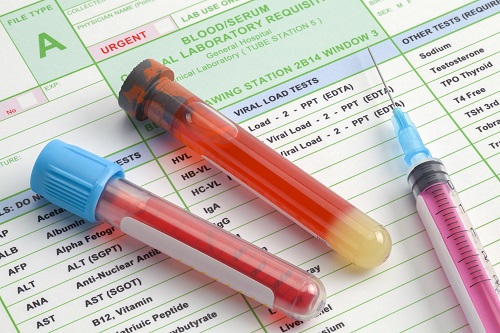 | AIHI Diagnostic Informatics systematic review of the impact of Health Information Technology on test result management to be published in JAMIAMs Yu Jia Julie Li, Dr Mary Dahm, Professor Johanna Westbrook and Professor Andrew Georgiou from the Diagnostic Informatics stream of the Centre for Health Systems and Safety Research have conducted a systematic review of the evidence on “The impact of Health Information Technology on the management and follow-up of test results”. It has been accepted for publication in the highly regarded Journal of the American Medical Informatics Association (JAMIA), the Association’s premier peer-reviewed journal for biomedical and health informatics. |
 | Tribute to Howard MorrisThe Diagnostics Informatics research team at the Australian Institute of Health Innovation was saddened to hear the news of the passing of Professor Howard Morris. Howard visited our team in Sydney last year on September 26, 2018, and spent a good part of the day exploring research ideas and proposals with us. He followed this up with a memorable presentation of his ideas and work at an Australian Institute of Health Innovation seminar at Macquarie University. Howard worked hard with us to build a diagnostic informatics research collaboration. Like so many others, we were the beneficiaries of his extensive laboratory science knowledge and expertise and greatly valued the experience of working with him. Our thoughts go out to his family, friends and colleagues. |
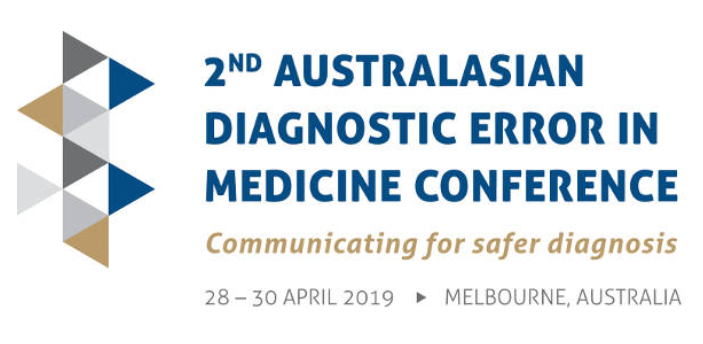 | AIHI Diagnostic Informatics research to feature prominently at the 2nd Australasian ‘Diagnostic Error in Medicine’ ConferenceThis year, the conference will feature several team members from the Diagnostic Informatics stream of the Centre for Health Systems and Safety Research, including two keynote presentations by Professor Rita Horvath and Dr Mary Dahm an interactive symposium with Professor Andrew Georgiou and oral presentations of the latest work from Dr Rae-Anne Hardie and Ms Melissa Miao. Read more here. |
 | New AIHI Diagnostic Informatics research on high-risk diagnostic test results presented at Australia’s leading pathology conferenceDiagnostic Informatics Master of Research student Wilson Punyalack recently presented his research on high-risk diagnostic test results at the Royal College of Pathologists of Australasia Annual Conference in Melbourne in February, Australia’s leading pathology conference. Wilson’s research team included Professor Andrew Georgiou, Dr Rae-Anne Hardie, Associate Professor Ling Li and Ms Yu Jia Julie Li. |



